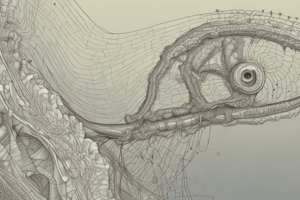Podcast
Questions and Answers
When was this textbook approved by the Coordination Committee?
When was this textbook approved by the Coordination Committee?
This textbook was approved by the Coordination Committee on 30.01.2020.
What is the purpose of the Coordination Committee formed by GR No. Abhyas?
What is the purpose of the Coordination Committee formed by GR No. Abhyas?
The purpose of the Coordination Committee is to approve and prescribe textbooks for academic implementation.
How can students access additional study material related to each lesson?
How can students access additional study material related to each lesson?
Students can access additional study material by scanning the Q.R.Code on the textbook page using the DIKSHA App on their smartphones.
When will the implementation of this textbook begin?
When will the implementation of this textbook begin?
Who holds the rights to the book?
Who holds the rights to the book?
What is reproduction and why is it important?
What is reproduction and why is it important?
What are the two types of reproduction?
What are the two types of reproduction?
How does asexual reproduction differ from sexual reproduction?
How does asexual reproduction differ from sexual reproduction?
What is the importance of asexual reproduction?
What is the importance of asexual reproduction?
What is the importance of sexual reproduction?
What is the importance of sexual reproduction?
Flashcards
Coordination Committee Approval Date
Coordination Committee Approval Date
The textbook was approved by the Coordination Committee on 30.01.2020.
Purpose of Coordination Committee
Purpose of Coordination Committee
To approve and prescribe textbooks for academic implementation.
Accessing Additional Study Material
Accessing Additional Study Material
Students can scan a Q.R. Code on the textbook page using the DIKSHA App.
Textbook Implementation Start
Textbook Implementation Start
Signup and view all the flashcards
Rights to the Textbook
Rights to the Textbook
Signup and view all the flashcards
Asexual Reproduction
Asexual Reproduction
Signup and view all the flashcards
Sexual Reproduction
Sexual Reproduction
Signup and view all the flashcards
Importance of Asexual Reproduction
Importance of Asexual Reproduction
Signup and view all the flashcards
Importance of Sexual Reproduction
Importance of Sexual Reproduction
Signup and view all the flashcards
Types of Reproduction
Types of Reproduction
Signup and view all the flashcards
Study Notes
Textbook Information
- The textbook was approved by the Coordination Committee on 30.01.2020 and implemented from academic year 2020-21.
- The textbook is published by the Maharashtra State Bureau of Textbook Production and Curriculum Research, Pune, 2020.
Importance of Reproduction
- Reproduction is essential to continue and maintain the species.
- It helps organisms increase their number and maintain population size.
- It transmits specific hereditary characters from parents to offspring.
- It supports the process of evolution.
Types of Reproduction
-
Asexual Reproduction (Apomixis):
- Takes place without the fusion of gametes.
- Only one parent is involved.
- Cell division occurs only by mitosis.
- Offspring is genetically similar to the parents.
- It is a fast process.
- Variation does not occur.
-
Sexual Reproduction (Amphimixis):
- Takes place by the formation and fusion of gametes.
- Two parents are involved.
- Cell division involves meiosis.
- Gametes are involved.
- Offspring shows genetic variation.
Studying That Suits You
Use AI to generate personalized quizzes and flashcards to suit your learning preferences.




